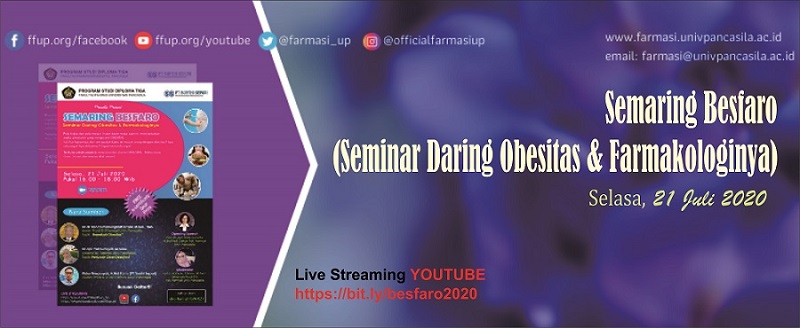Obesity is an abnormal accumulation of fat (excessive) and is very risky for health. A person is considered obese if he has a Body Mass Index (BMI) 30. This was conveyed by Dr. dr. Bona Simanungkalit, DHSM, M.Kes., FIAS in the Obesity and Pharmacology Online Seminar (Besfaro) on Tuesday (21/7/2020). This seminar was organized by the D3 Study Program of the Faculty of Pharmacy, University of Pancasila and was enthusiastically attended by more than 500 participants from all over Indonesia.
First of all, the event was opened by the Dean of the Faculty of Pharmacy, University of Pancasila, Prof. Dr. apt. Shirly Kumala, M. Biomed. He said that the D3 Pharmacy study program had been established since 2004. Until now, many of its alumni have had careers in agencies, companies, and the government sector.
In this seminar, the D3 Pharmacy Study Program as the organizer also invited alumnus of the D3 Study Program, Br. Rizky Firmansyah, A.Md. Farm who shared his experiences during college and after graduating from the D3 Fak program. Pancasila University Pharmacy. Currently he works as a marketing at PT. Sunthi Sepuri. In addition, also present, Dr. apt. Yati Sumiyati, M.Farm (Lecturer of the Faculty of Pharmacy, University of Pancasila) as the material presenter.
The presentation of the first material of the seminar “Online Obesity and Its Pharmacology” was delivered by Dr. dr. Bona Simanungkalit, DHSM, M.Kes., FIAS. He is a lecturer in the D-3 Pharmacy Study Program at Pancasila University with the theme “Should I be Obesity?”. In this seminar, he explained about the prevalence of obesity, risks and how to prevent obesity itself. According to him, obesity in Indonesia has reached 21.8% and is more experienced by women than men. To find out whether a person is obese or not, it can be seen through the Body Mass Index (BMI) with the following formula.

Information:
BB (Weight)
TB (Height) is calculated squared
Explanation of Body Mass Index BMI according to WHO:

Another way to calculate Central Obesity is through abdominal circumference. As stated by Dr. dr. Bona, if a man has an abdominal circumference above 90 cm and a woman has an abdominal circumference above 80 cm, it can be said to have been obese.
In detail, Dr. dr. Bona explains some of the causes of obesity. Lack of physical activity is little / low and the consumption of calories in and out is not balanced will cause heart disease, diabetes, joint disorders, and cancer. According to him, the way to prevent/reduce obesity is through commitment, environmental support, healthy food (reducing sugar), increasing regular and consistent physical activity, limiting calorie consumption, and increasing consumption of fruits and vegetables. During the current COVID-19 pandemic, when physical activity is limited, the risk of obesity needs to be watched out for.
The next material, “Do you need Obesity Drugs?”, was presented by Dr. apt. Yati Sumiyati, M. Farm. He reminded to be aware of the use of diet drugs for health, especially drugs that are consumed continuously without a doctor’s supervision and prescription.
“Do you need antiobesity medication?” He explained that this needs to be done if the BMI is 30 and has been trying to exercise, behavior modification, and eating patterns for at least 3 months but fails to lose weight to a reasonable limit. In this special condition, anti-obesity drugs are needed (of course with a doctor’s monitoring).
Dr. apt. Yati Sumiyati, M.Farm explained that the many diet drugs on the market only reduce body fluids and also function as laxatives. The way these drugs work is to reduce weight with diuretics (urine launchers), which reduce body fluids and not reduce fat. Of course, this will cause the body to become dehydrated. Likewise, laxative diet drugs will result in absorption so that the body will be malnourished. According to him, the correct obesity drug (antiobesity) should reduce the size of fat cells into smaller ones and reduce body weight.
According to Dr. Yati, an example of a legal anti-obesity drug from BPOM is Orlistat, a drug whose mechanism of action is to inhibit lipase and Methylcellulose, a mass-forming drug. Both drugs act on the gastrointestinal tract. Furthermore, examples of antiobesity drugs that act on the central (brain) include: Dexfenfluramine, Fenfluramine, and Diethylpropion (amphepramon). The drugs above work to suppress appetite.
In line with Dr. Bona, Dr. Yati explained that the use of drugs needs to be balanced with exercise, diet, and consultation with a doctor.
The seminar video can be seen on the following page:
News related to this seminar has also been published in the daily newspaper Radar Depok Edition Wednesday, July 22, 2020:
